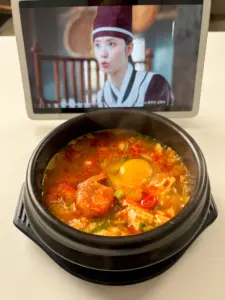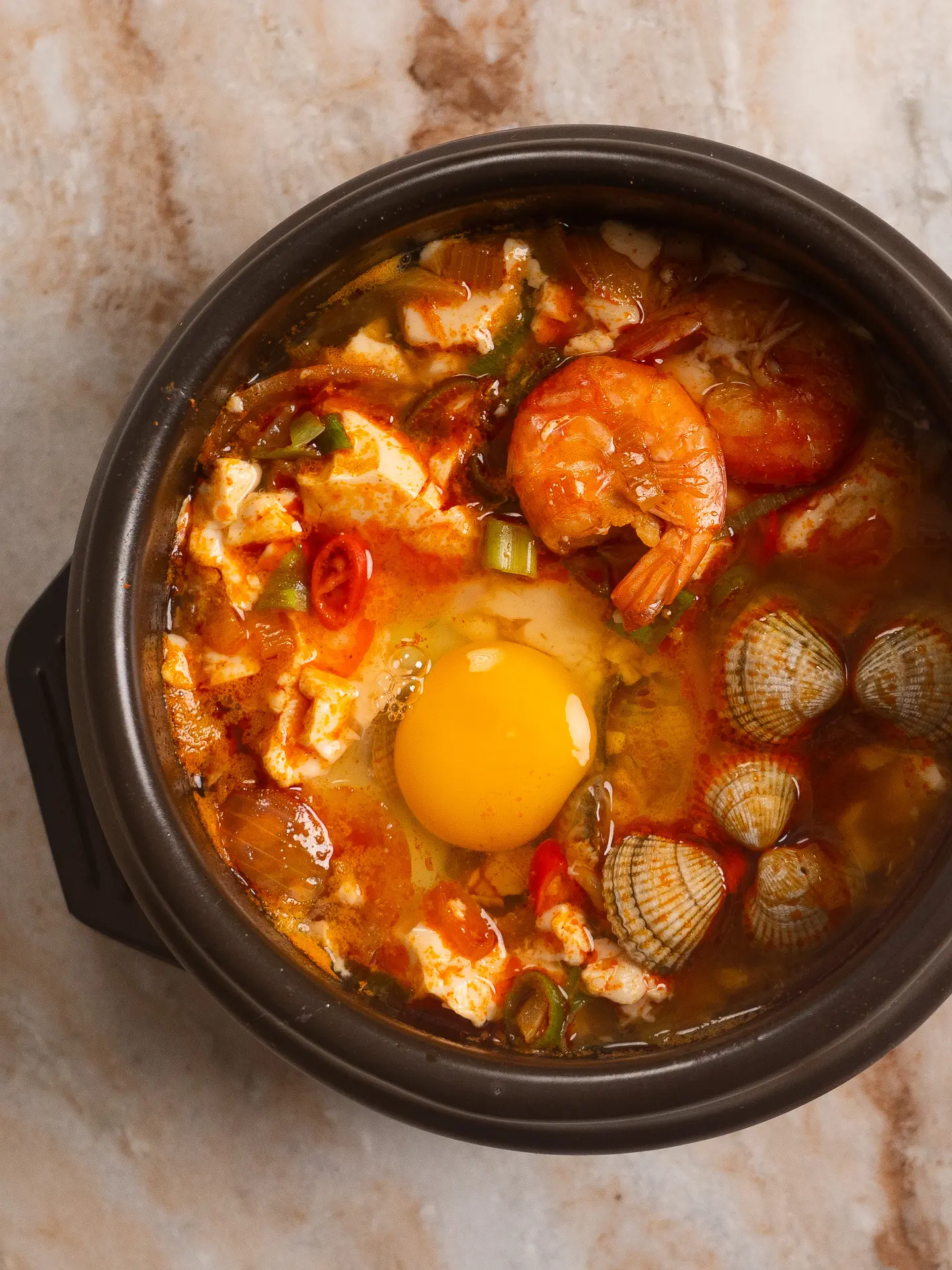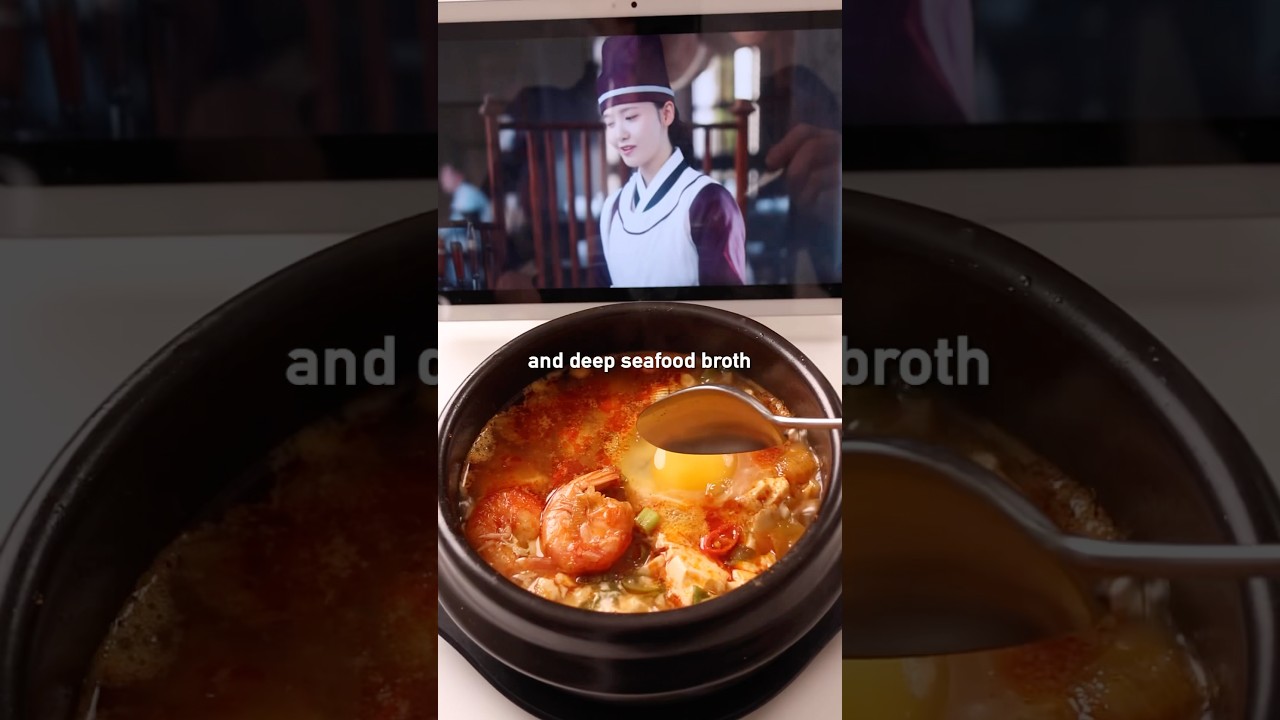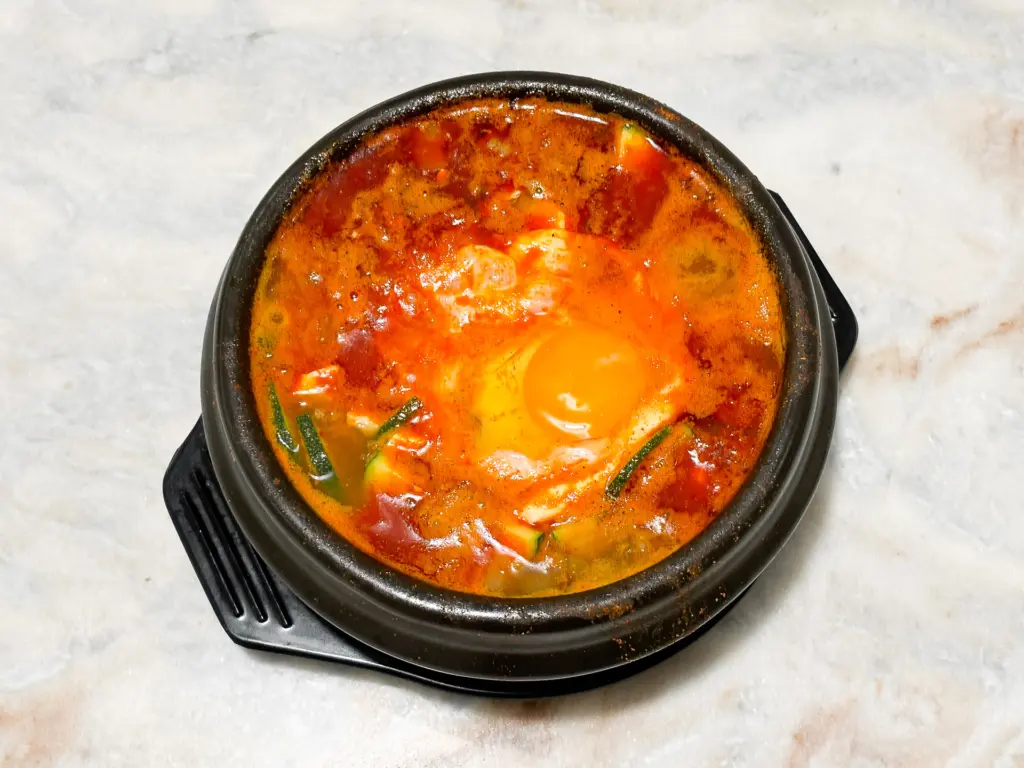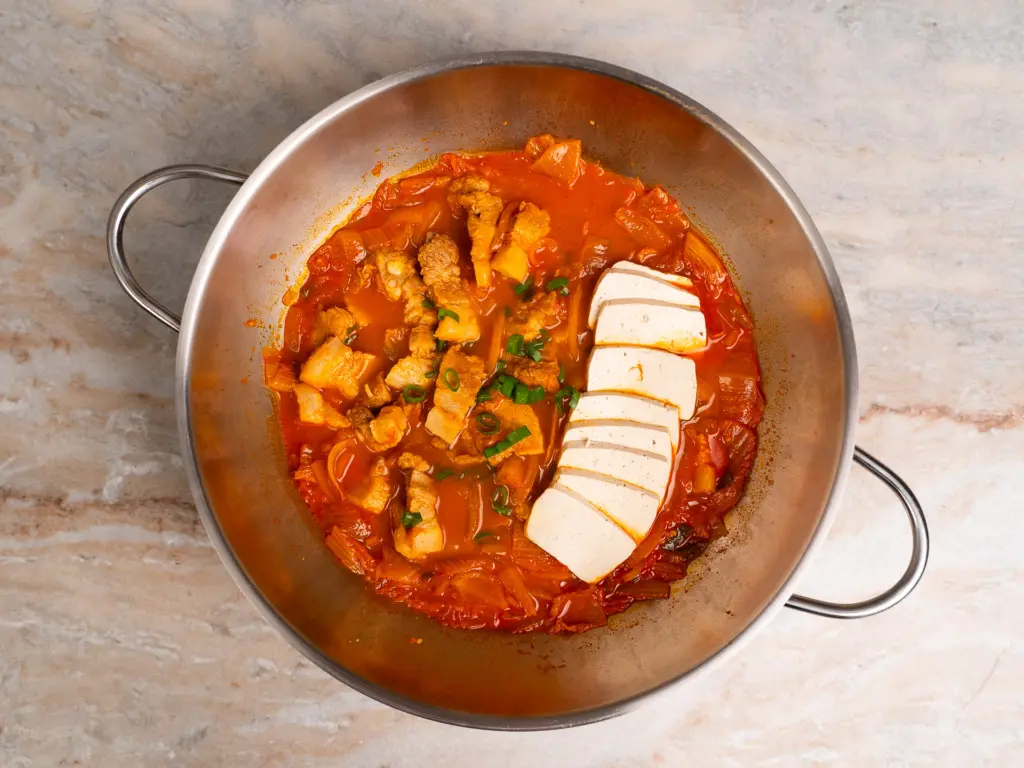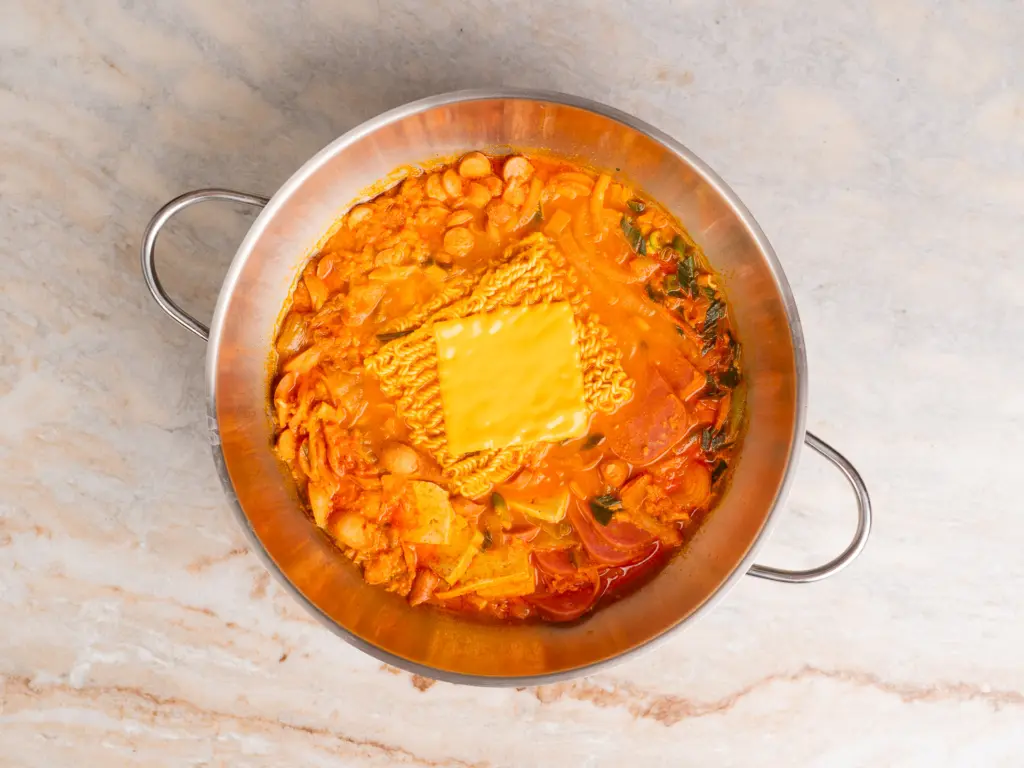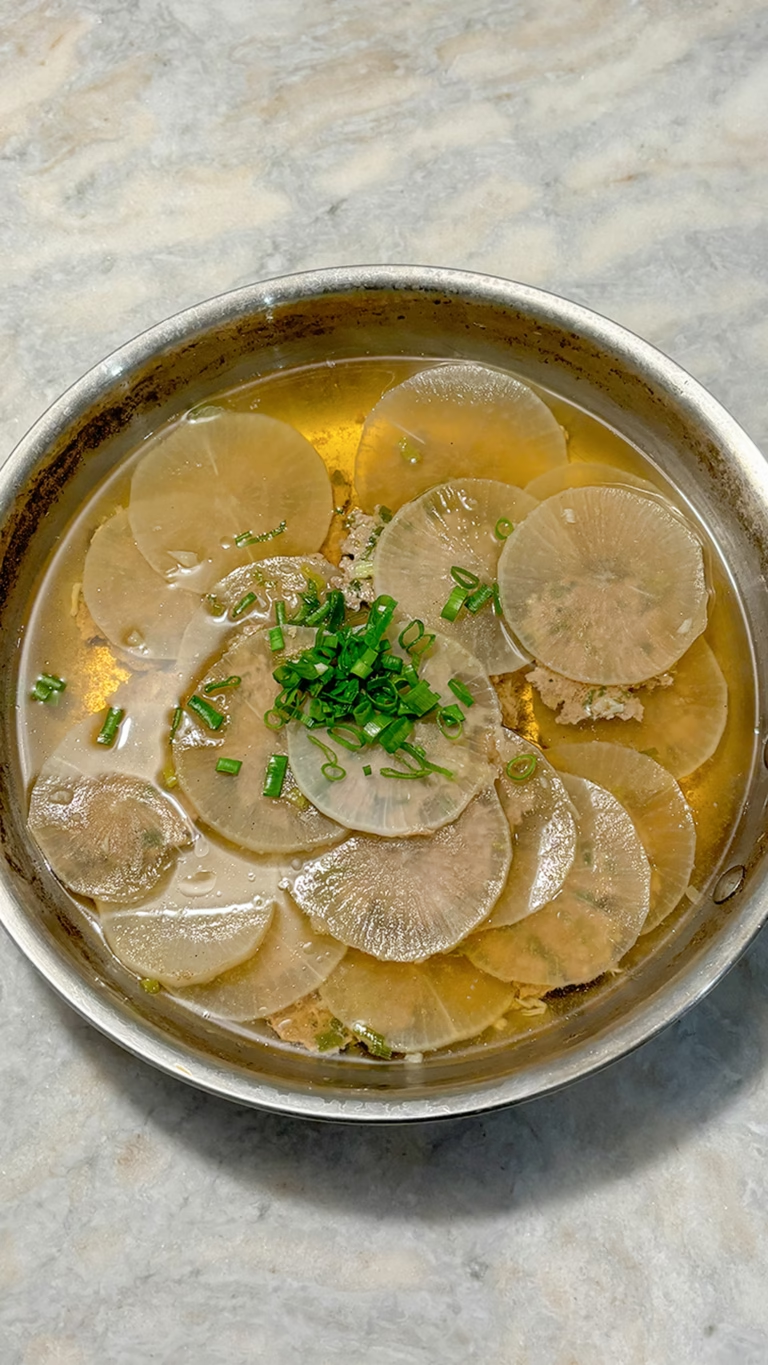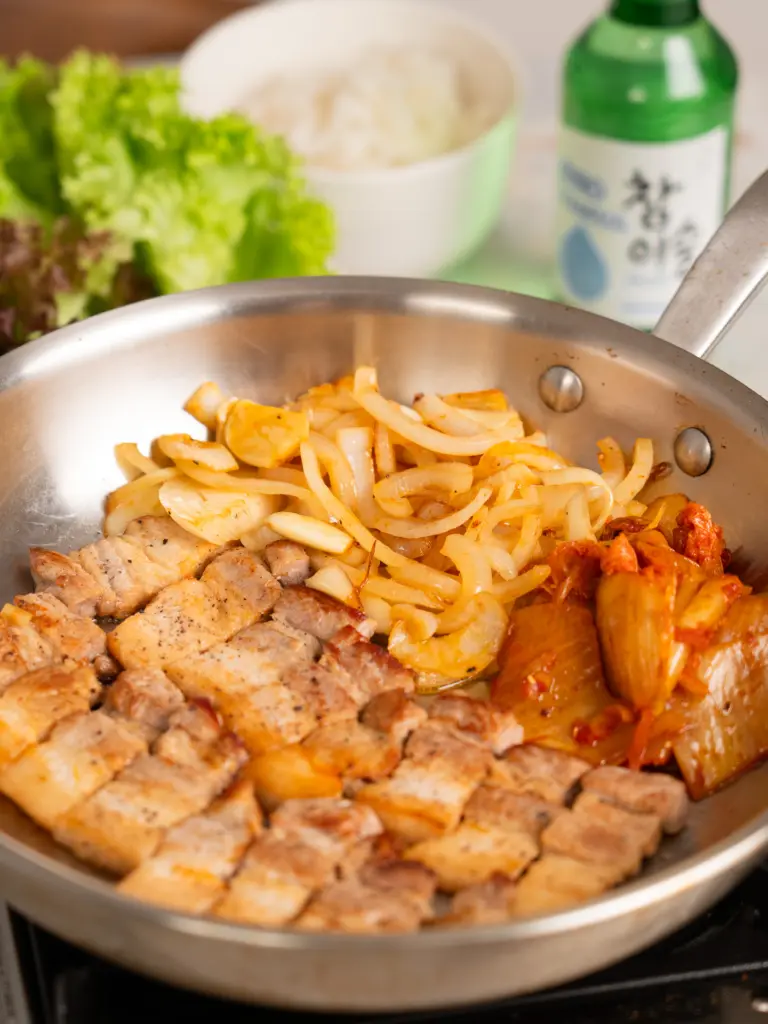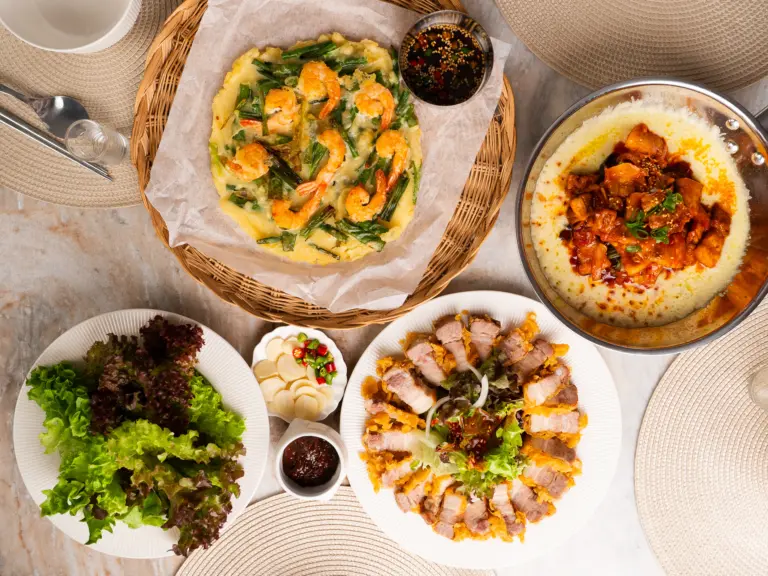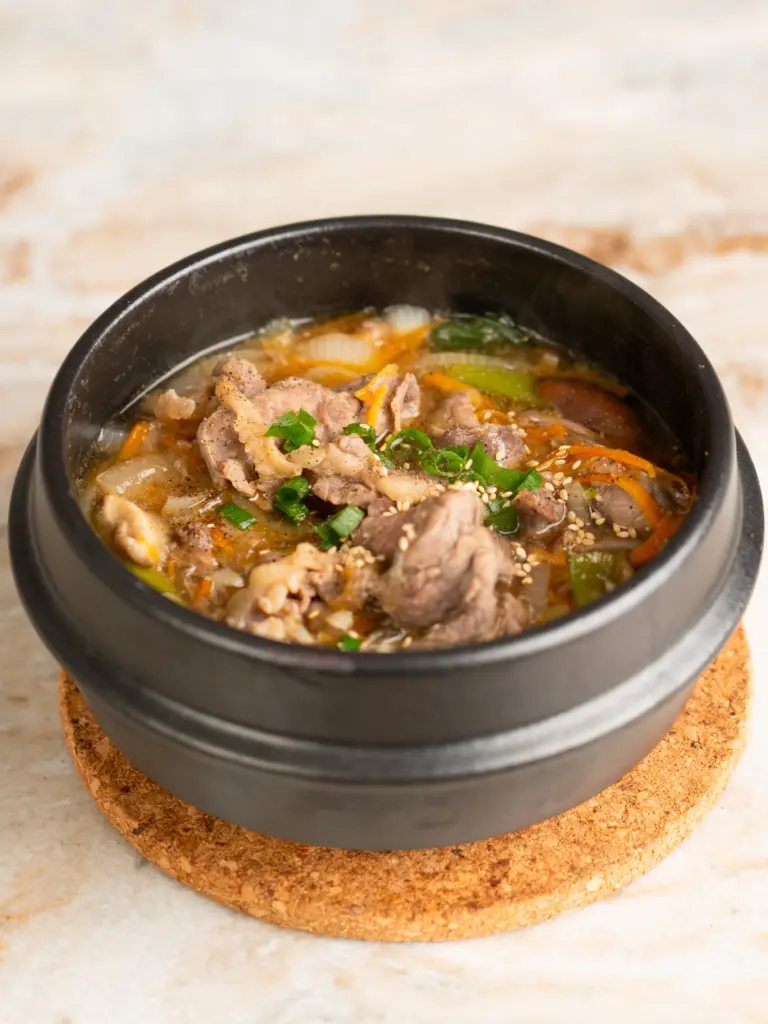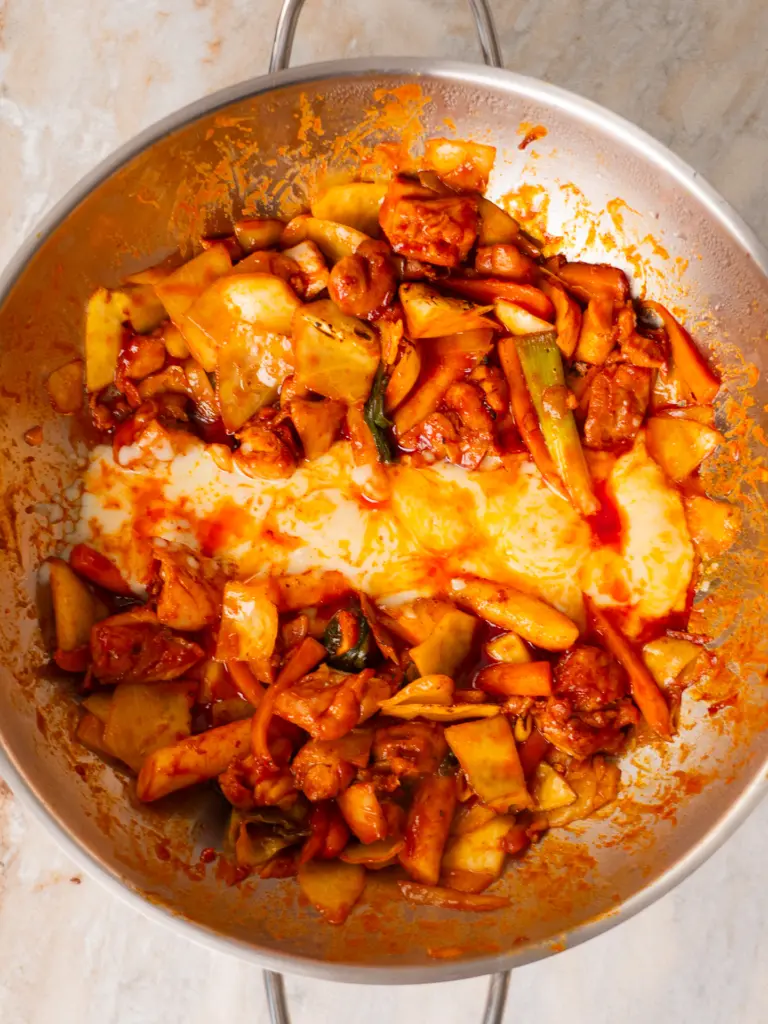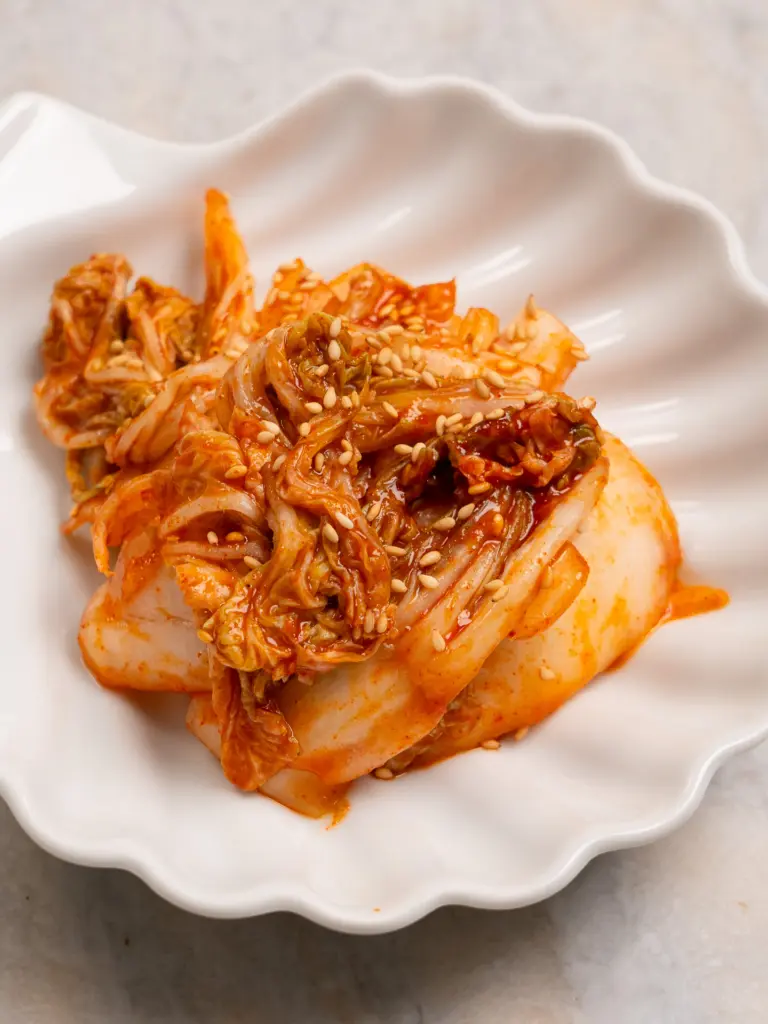Easy Korean Seafood Sundubu Jjigae with Clams & Shrimp
This is a healthy and delicious Seafood Sundubu Jjigae recipe packed with clams and shrimp that create an incredibly rich, deep broth. Compared to beef sundubu jjigae, this version has a much lighter and cleaner taste, perfect for when you want something comforting but not too heavy.
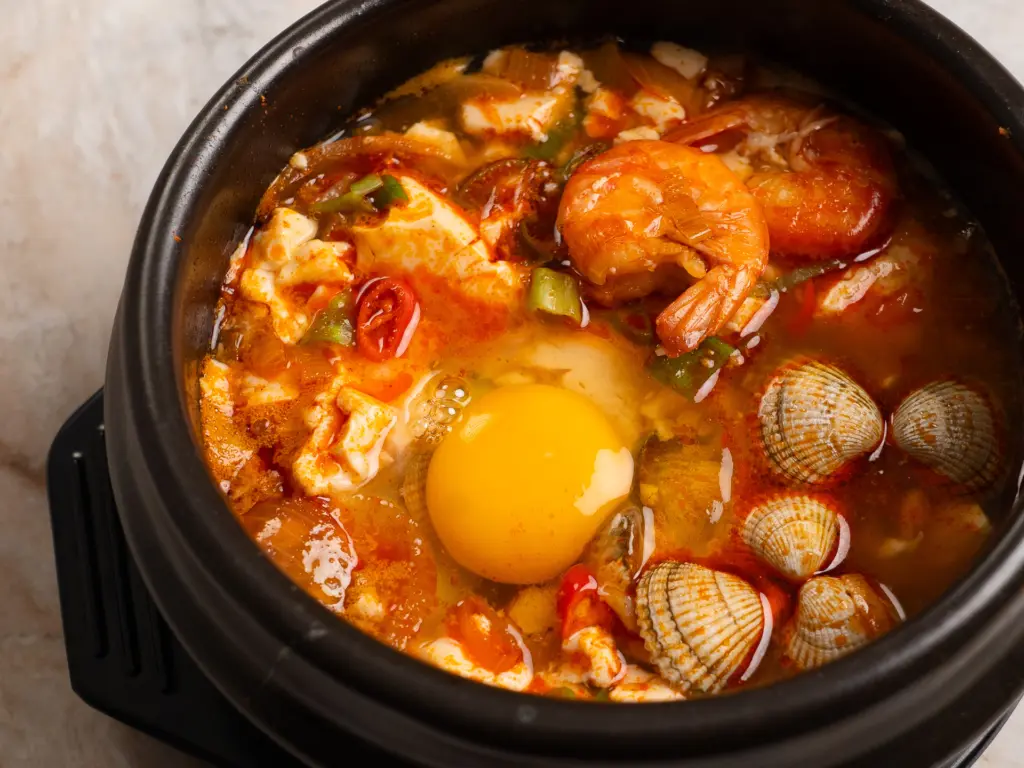
I’m sharing my Korean mom’s secret recipe, the one she always made on chilly days. Now that the weather’s getting colder, let’s warm up with a bowl of Korean tofu soup that’s cozy, spicy, and full of ocean flavor.
What Is Seafood Sundubu Jjigae?
The Heart of Korean Comfort Food
Sundubu Jjigae is one of the most common stews cooked in Korean homes. Its main ingredient, sundubu (extra soft tofu), is inexpensive and considered a staple of everyday Korean cooking. Some people make it clear and mild, but most prefer the spicy version with chili oil — that’s the flavor Koreans love most.
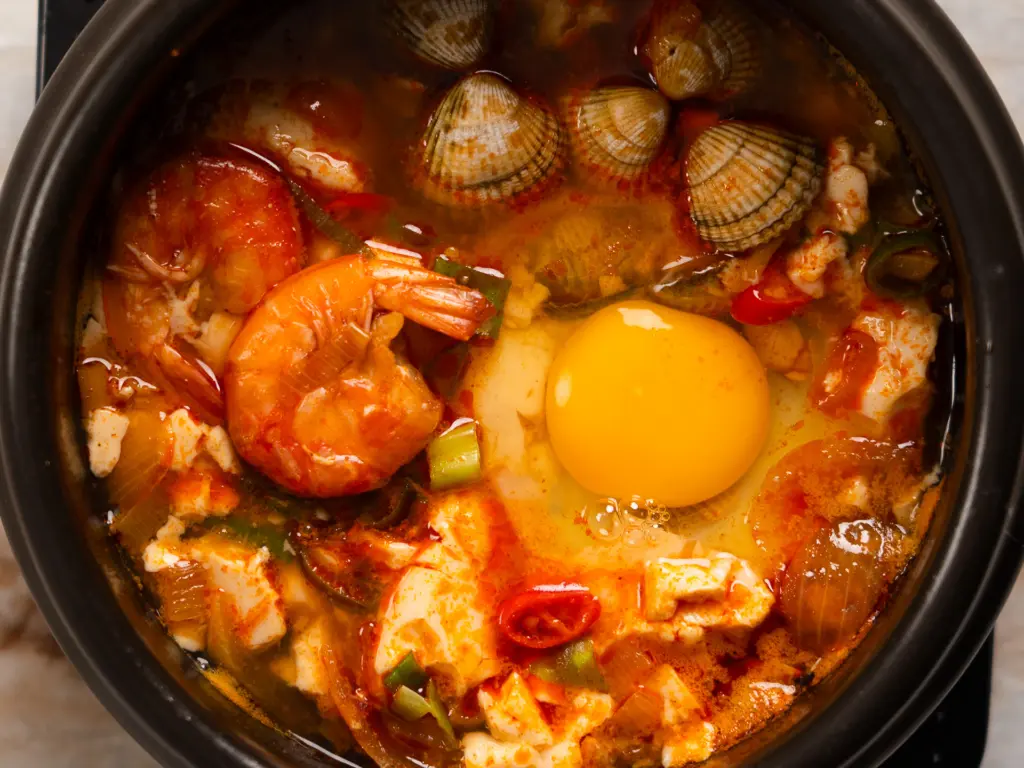
For many Koreans, the smell of sundubu jjigae brings back memories of a warm home and a mother’s love. It’s the ultimate comfort food — perfect for breakfast to warm up your body, but also great for lunch or dinner. The broth can be made with beef or pork, and many younger Koreans even use spam or ham for a quick version. Today, I’m making Seafood Sundubu Jjigae, just like my mom used to. She always added plenty of clams to create a deep, rich broth that made the stew incredibly flavorful.
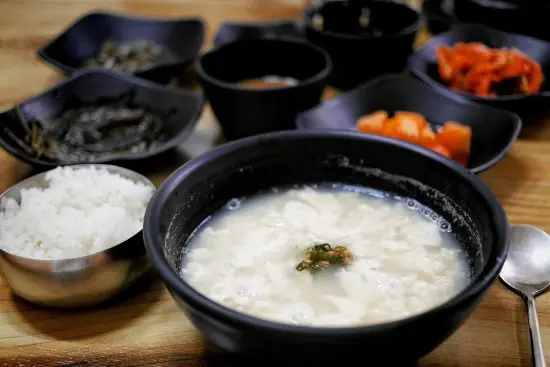
How It Differs from Other Korean Tofu Soups
In Korea, there are many types of soups and stews that include tofu. The tofu used in typical Korean soups (guk) is soft but slightly firmer than sundubu. For spicy tofu stews (dubujjigae), people usually use regular soft tofu or medium-firm tofu.
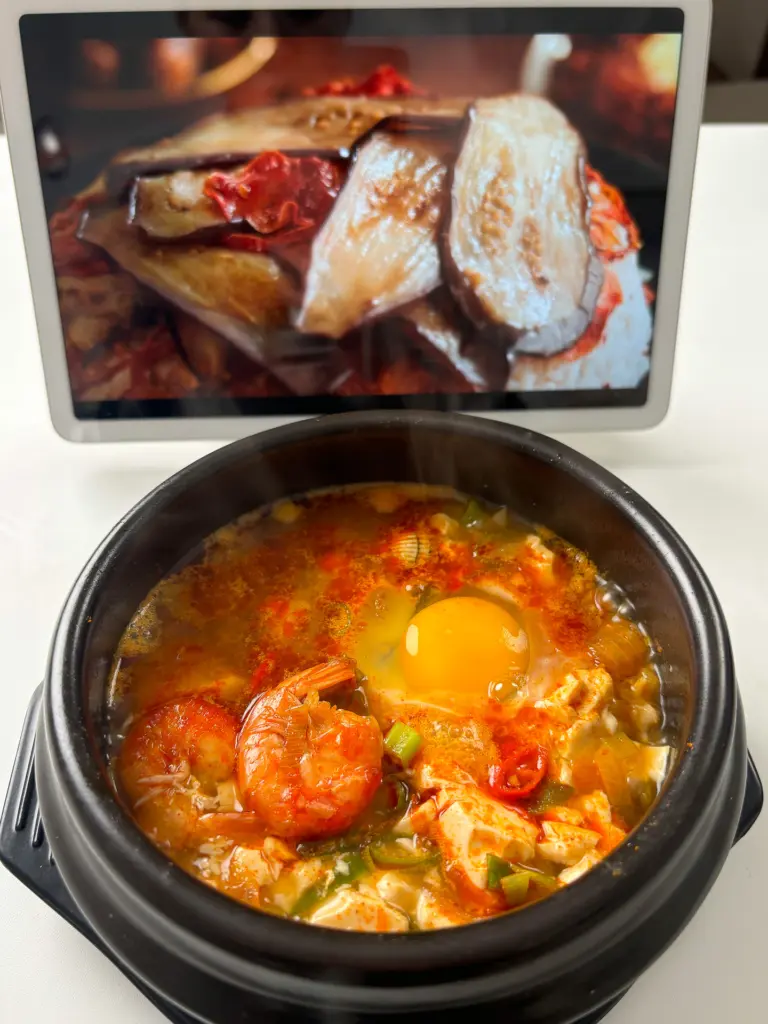
However, the tofu used for seafood Sundubu Jjigae is much softer and more delicate — it easily breaks apart with a spoon, giving the stew its signature silky texture. When shopping, look for tofu labeled “silken tofu” — that’s the one made for soondubu jjigae.
- Silken tofu on Amazon
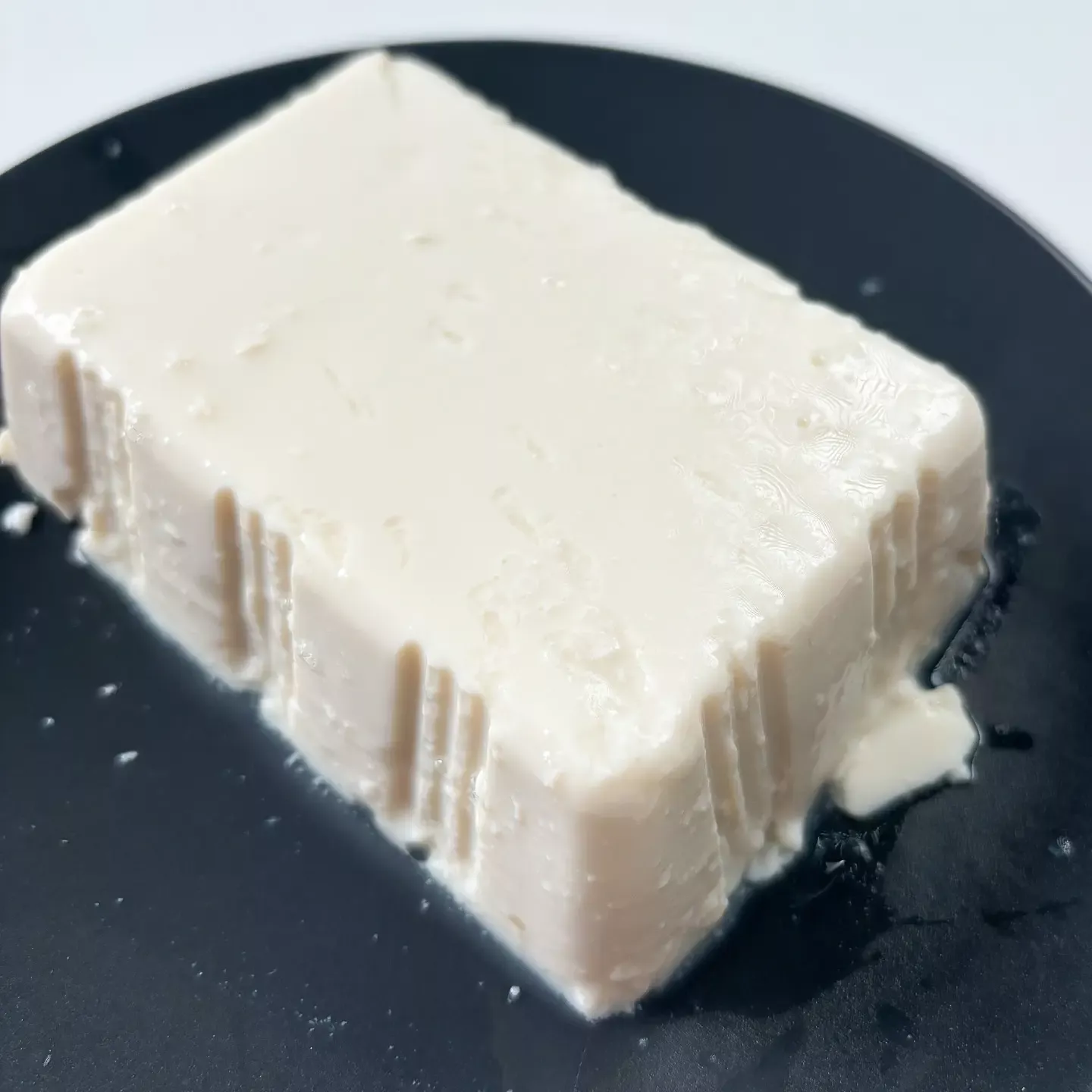
Ingredients for Seafood Sundubu Jjigae
Main Ingredients
- Soft tofu (Silken tofu / 순두부) – The key ingredient that gives this stew its signature silky texture.
- Clams & shrimp – The base of the rich, ocean-flavored broth.
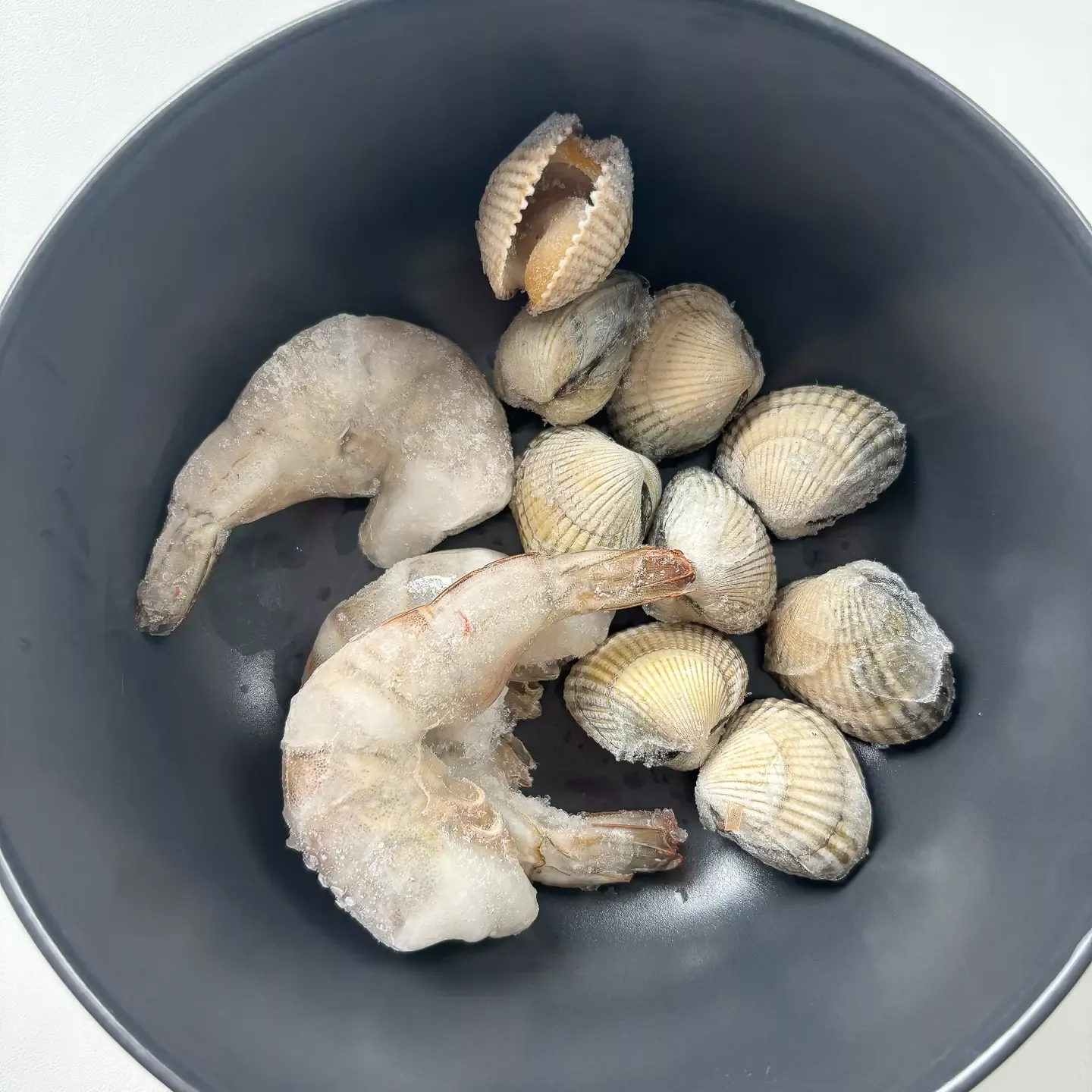
Other Ingredients
Green onion, onion, garlic, Korean chili flakes (gochugaru), soy sauce, and tuna extract (참치액젓) or Korean fish sauce, plus one egg for finishing.
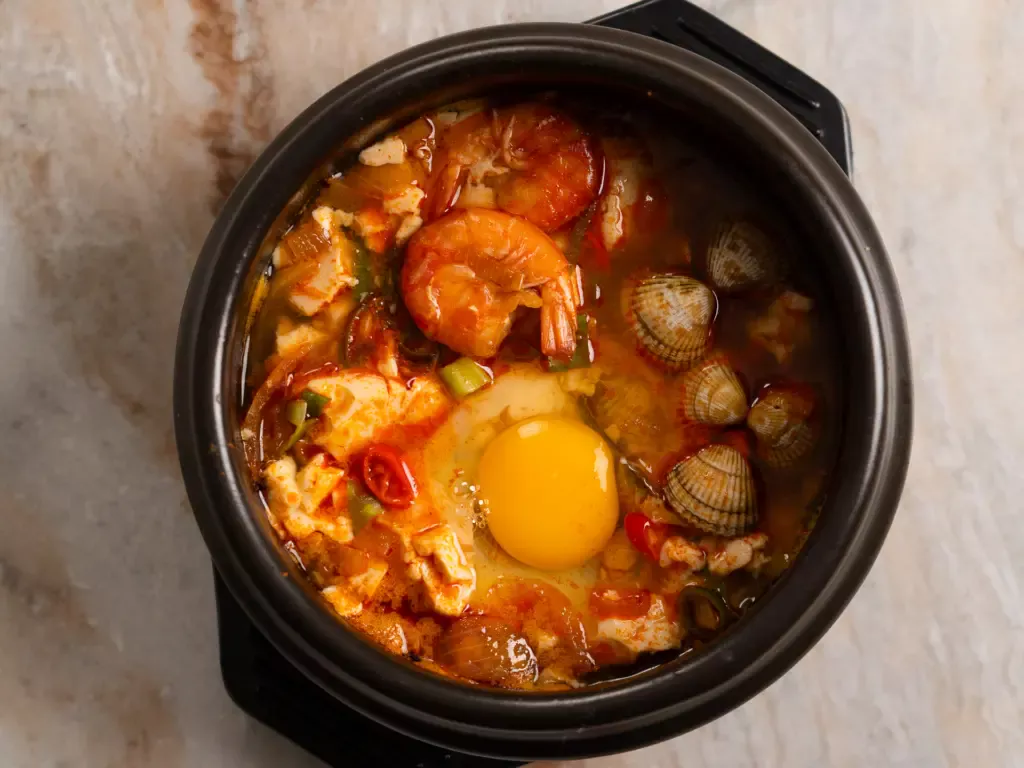
Optional Add-ins & Substitutes for Seafood Sundubu Jjigae
Dashida (Korean soup stock powder)
Dashida is an essential ingredient for seafood sundubu jjigae if you want to recreate the deep, savory flavor of sundubu jjigae served at Korean restaurants. If you don’t have it, you can replace it with oyster sauce or at least a small pinch of MSG to boost umami. If you only have one type (beef dashida or anchovy dashida), you can use that alone — no need for both.
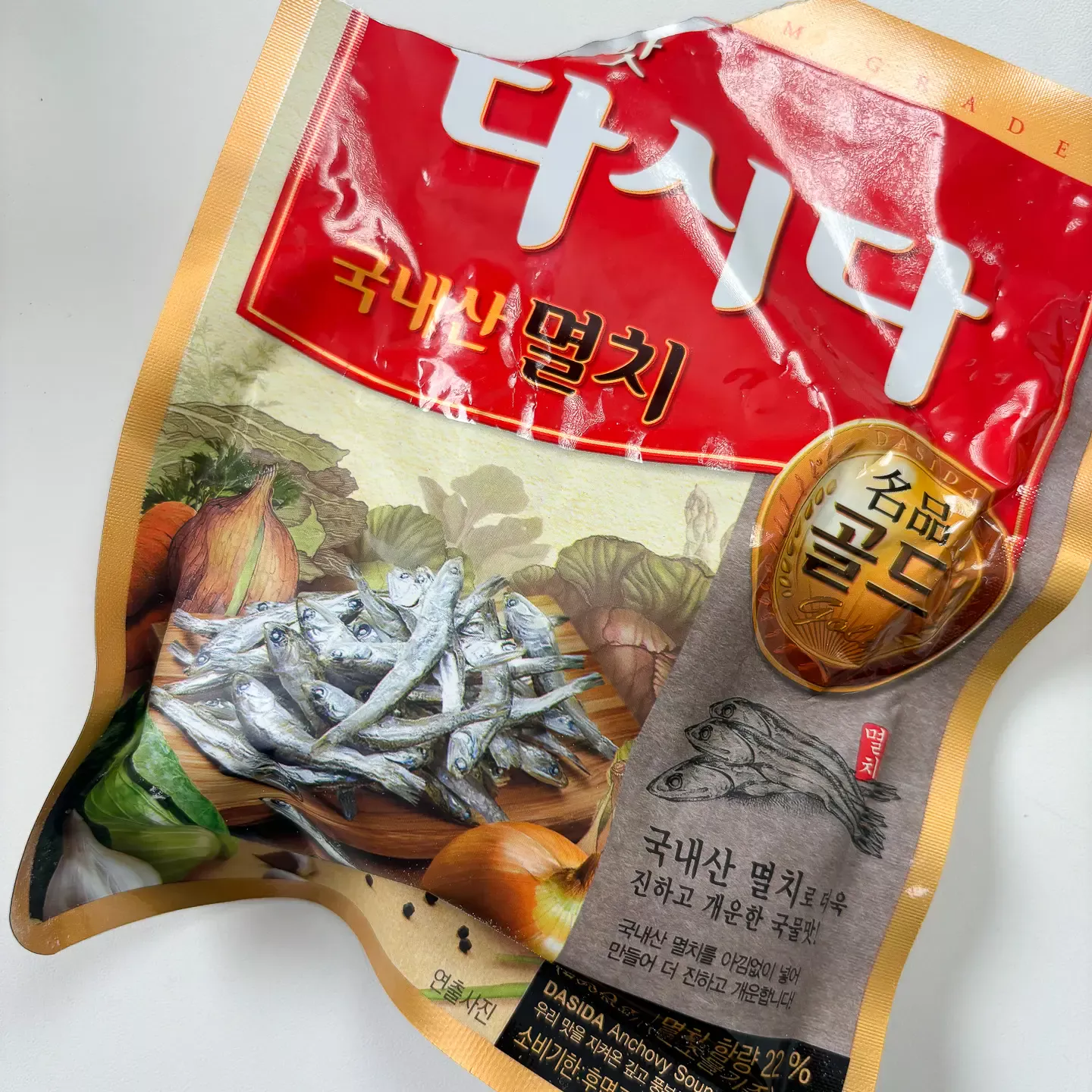
Tuna Extract Fish Sauce
This is a popular modern alternative to traditional Korean anchovy fish sauce. It’s less fishy but twice as flavorful, giving the stew a deep umami taste. If unavailable, use Korean anchovy fish sauce, or as a last resort, soy sauce — though it won’t have the same depth of flavor.
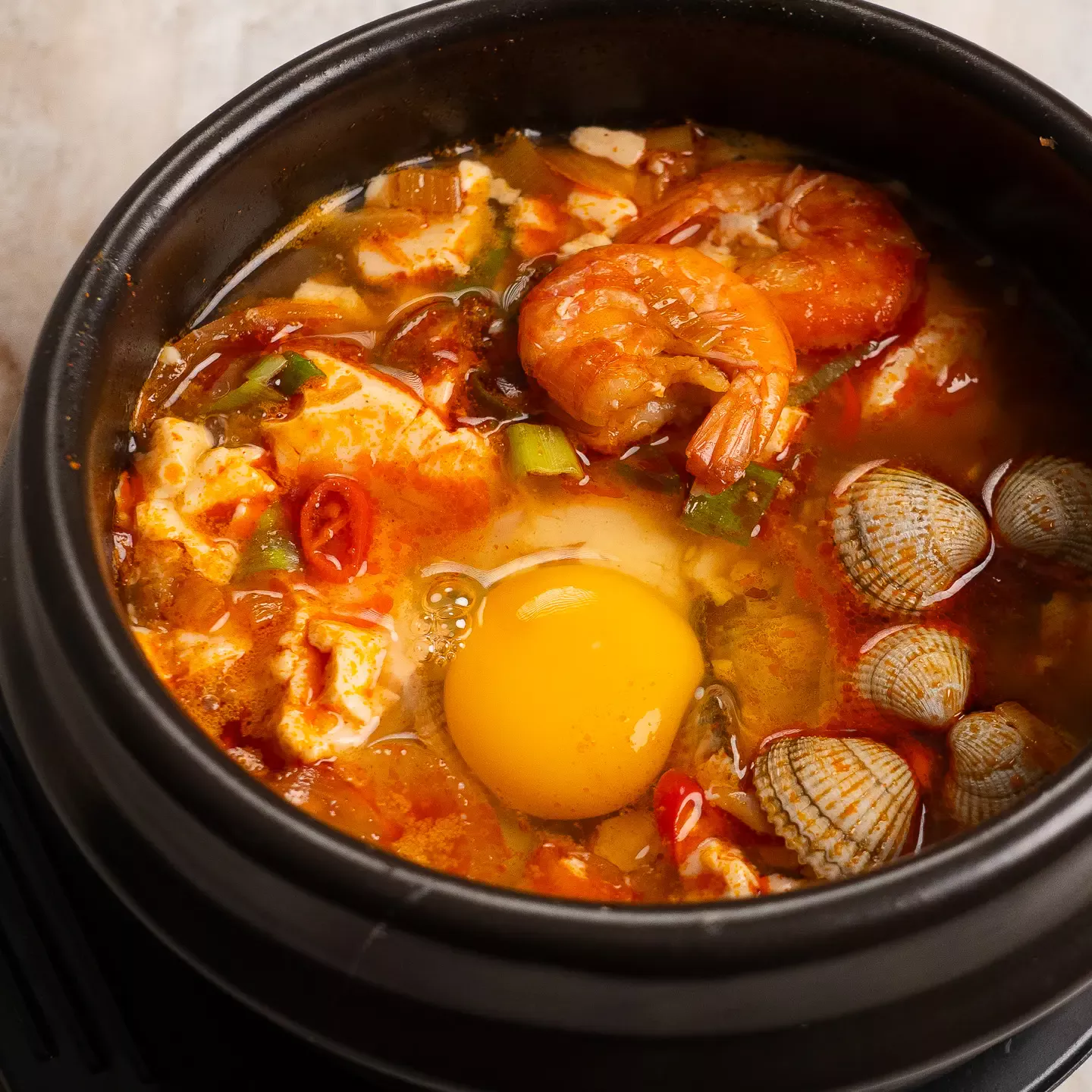
Other Seafood Options
You can add mussels, squid, or even frozen mixed seafood for convenience. It all works beautifully in this spicy tofu stew.
Vegetarian Soondubu Jjigae
Replace seafood and fish sauce with Korean vegetable stock, and add zucchini for extra flavor. Still, I highly recommend adding a small pinch of MSG — it makes a huge difference in recreating the authentic Korean taste.
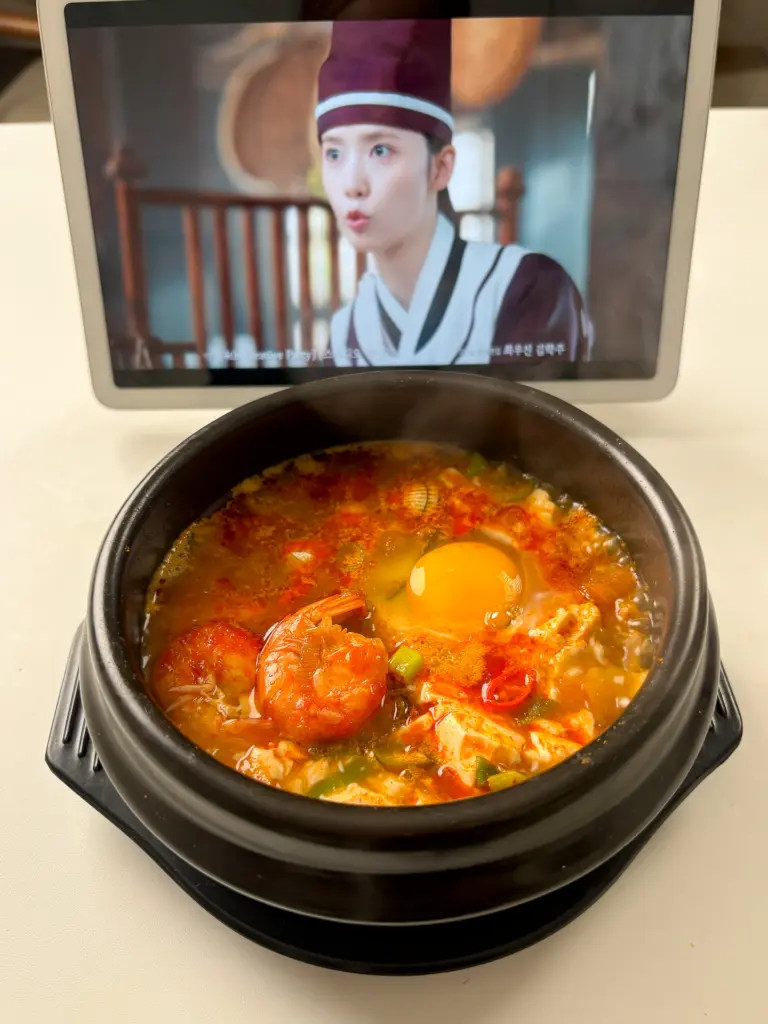
Step-by-Step Seafood Sundubu Jjigae Recipe
Prep the Ingredients
- Thinly slice the onion and chop the green onion. Mince the garlic and set everything aside.
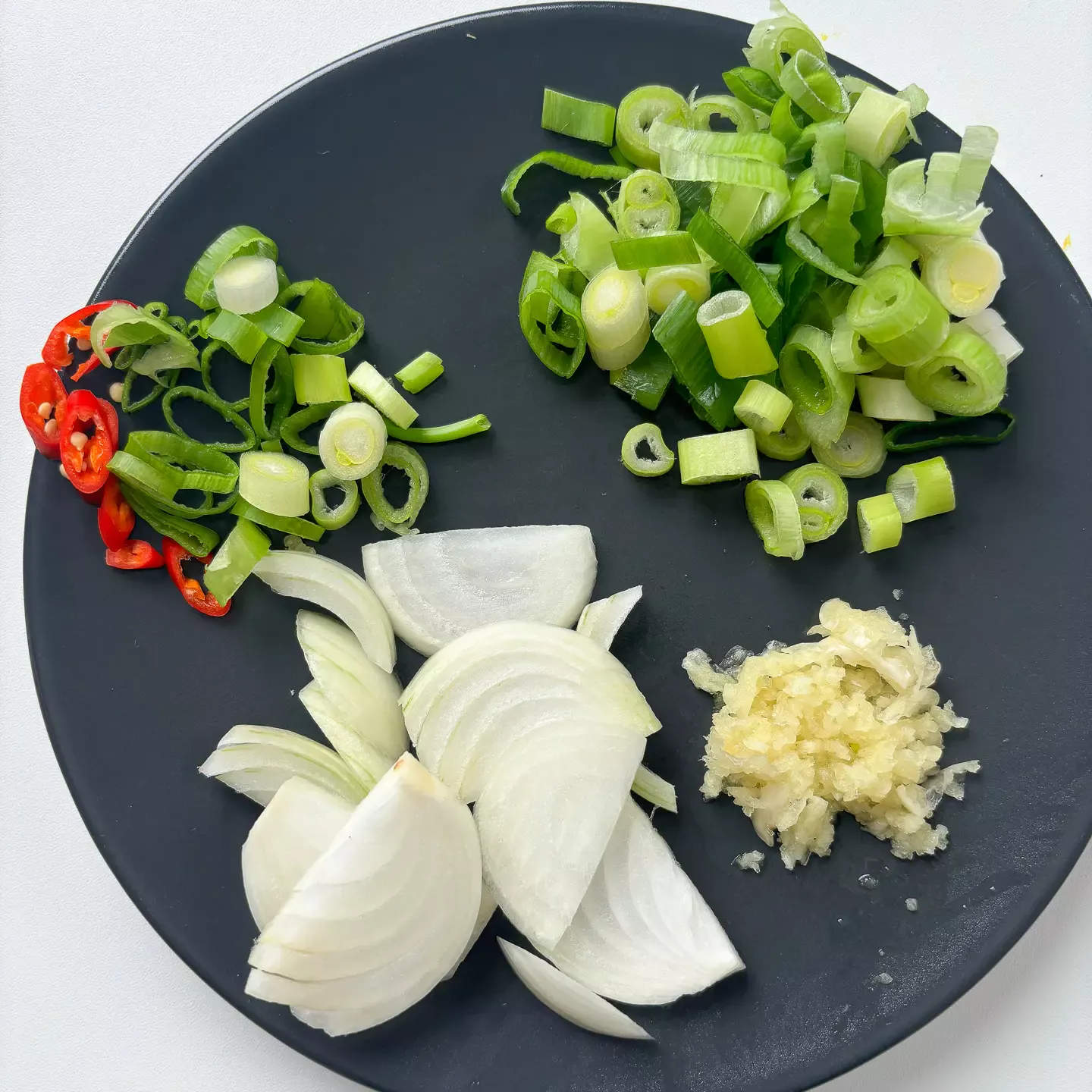
Make the Chili Oil (Gochu-gireum)
- In a ttukbaegi (Korean earthen pot) or small pot, heat 2 tablespoons of cooking oil over low heat. Add the chopped green onion and minced garlic, and sauté until fragrant.
- Then add Korean chili flakes (gochugaru) and stir gently to create chili oil. Keep the heat low — if it’s too hot, the chili flakes will burn.
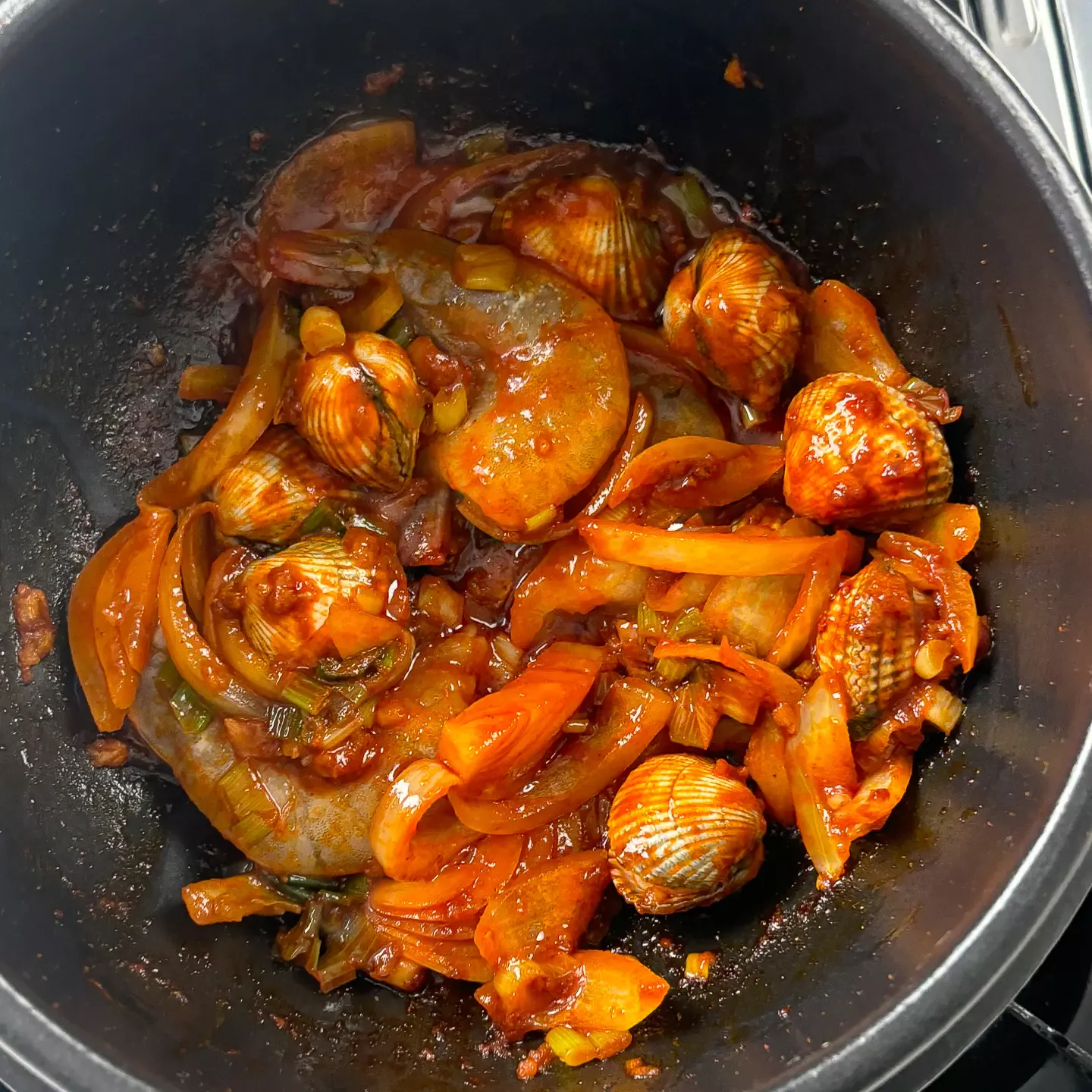
Add the Seafood and Broth Base
- Add the sliced onion and soy sauce, and stir-fry for about 1 minute. Then add the clams and shrimp, tossing everything together so they’re coated in the chili oil.
- Pour in 350 ml of water, just enough to cover the ingredients, and bring it to a boil over high heat. Once it starts boiling, add tuna extract (or Korean anchovy fish sauce), beef dashida, anchovy dashida, and a small pinch of MSG (optional) for depth of flavor. Let it simmer for a few minutes until the seafood is cooked and the broth turns rich and red. Then it tastes like anchovy clam broth.
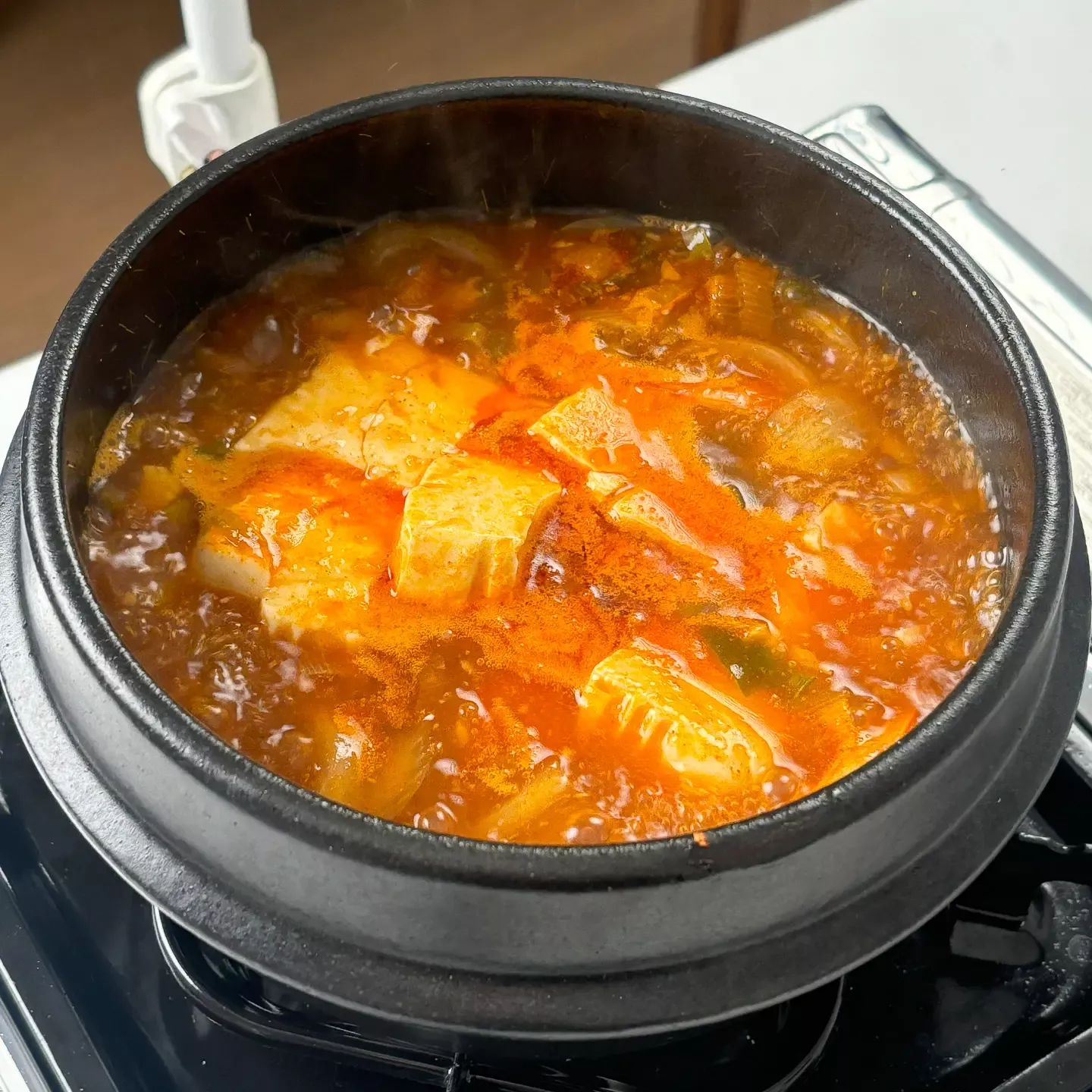
Add the Soft Tofu (Sundubu)
- Add the soft tofu (silken tofu) and gently break it apart with a spoon — no need to mix too much. Taste the broth and adjust the seasoning with a pinch of salt if needed.
- Turn off the heat and crack a raw egg on top. Right before serving, stir the seafood sundubu jjigae while it’s still hot so the egg cooks naturally in the bubbling broth.
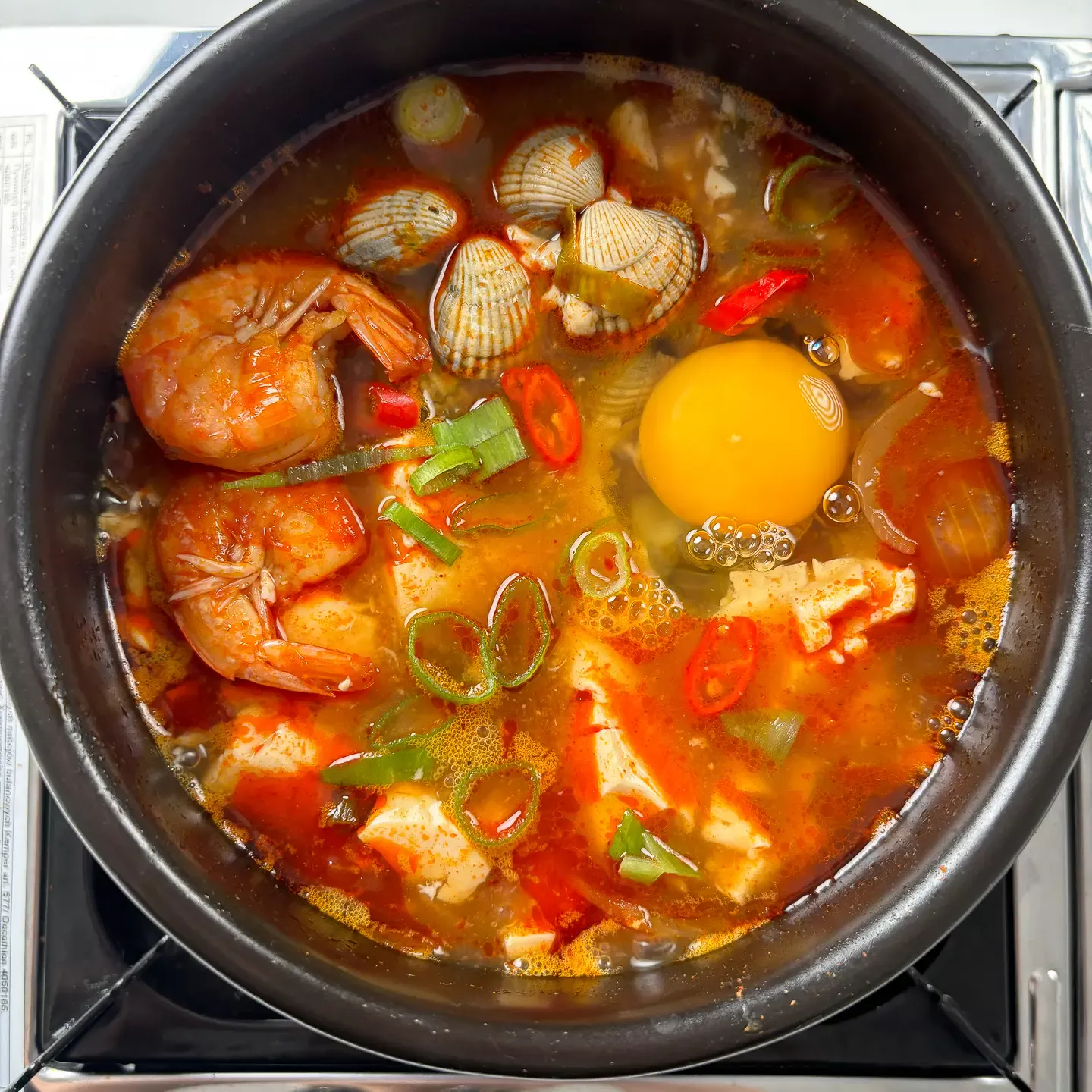
Fail-Proof Cooking Tips for Haemul Soondubu Jjigae
Make Chili Oil Over Very Low Heat
When making chili oil, keep the heat very low. Korean chili flakes (gochugaru) burn easily, and once they do, the oil turns bitter. Take your time — slow heat brings out that deep red color and rich aroma without burning.
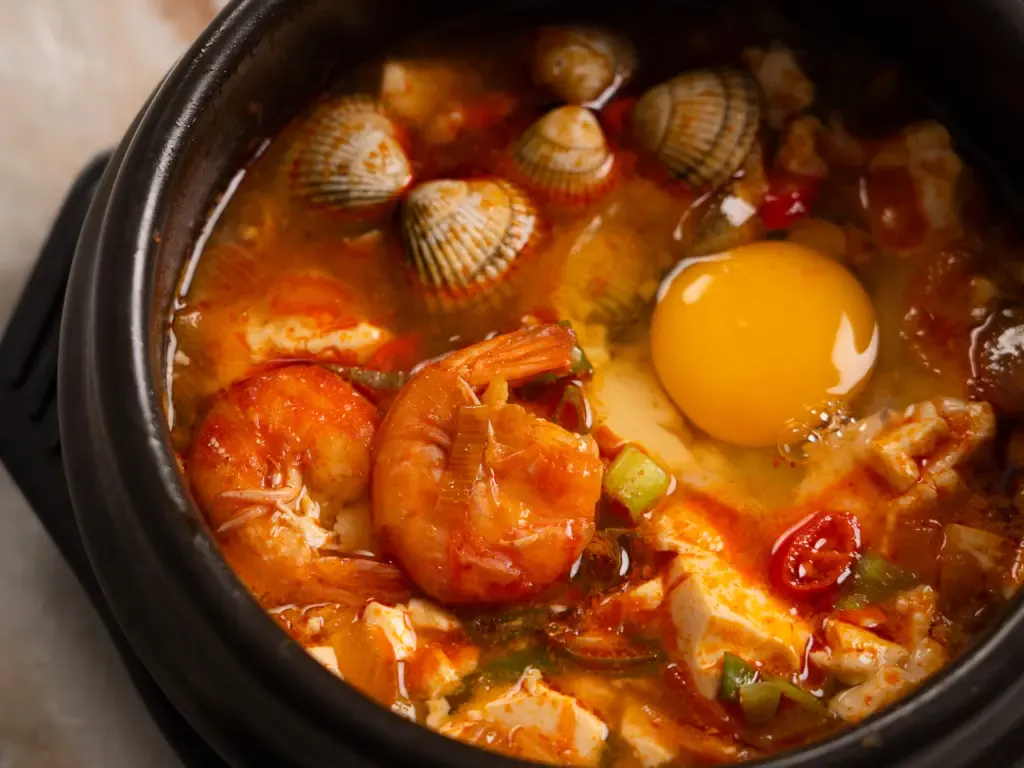
Don’t Taste Before Adding the Tofu
Before adding the soft tofu, the broth should actually taste a little salty — that’s normal! Once you add sundubu and let it simmer, the tofu releases moisture, naturally diluting the saltiness. So always taste and adjust the seasoning after adding the tofu. Then you’ll have the best seafood sundubu jjigae.
Add the Egg After Turning Off the Heat
Crack the egg after turning off the heat and gently stir while the broth is still hot. This way, the egg cooks softly in the residual heat, giving your Seafood Sundubu Jjigae a silky, creamy finish.
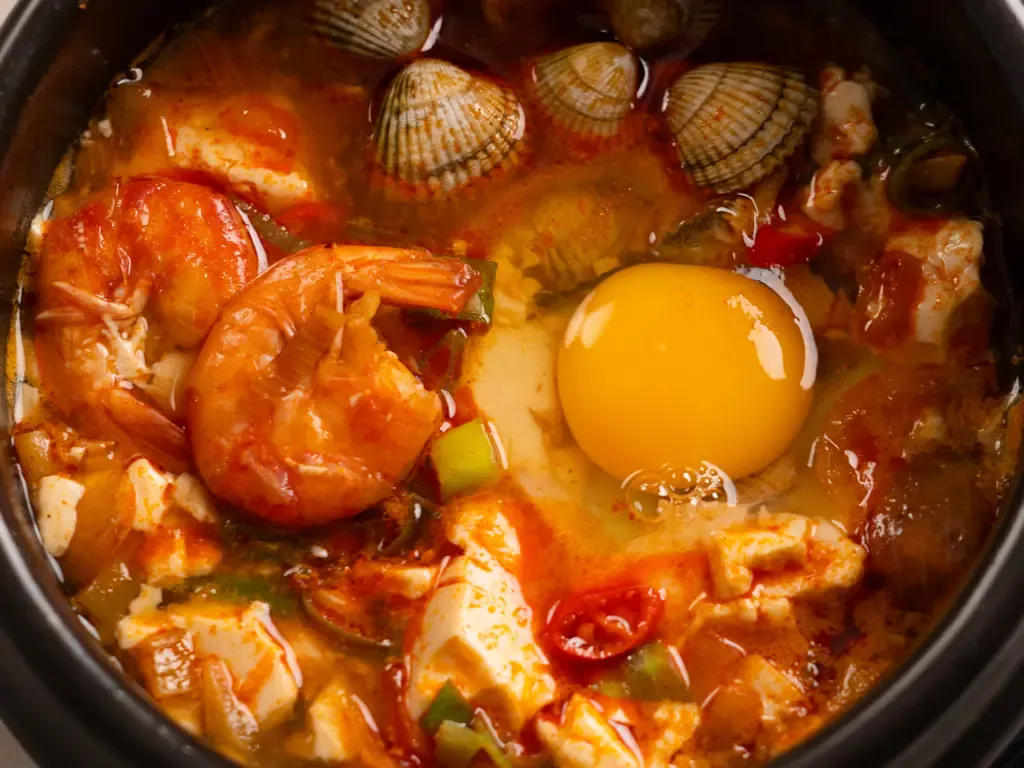
Serving Suggestions
- Steamed Rice: Seafood Sundubu Jjigae is always enjoyed with a bowl of hot steamed rice. The soft tofu and spicy broth mix perfectly with plain rice, creating the ultimate comforting meal.
- Kimchi: Every Korean meal is perfect with kimchi. Its tangy and spicy flavor pairs beautifully with the rich, savory broth of Seafood Sundubu Jjigae.
- Fried Egg on Rice: Many Koreans love topping their white rice with a fried egg when eating stews like sundubu jjigae. The soft yolk mixes into the rice and broth, making every bite richer and smoother.
- Other Side Dishes (Banchan): For a more complete Korean meal, serve it with a few side dishes.
I like to pair my sundubu jjigae with tteokgalbi (Korean short rib patties) and stir-fried eggplant — simple but so satisfying.
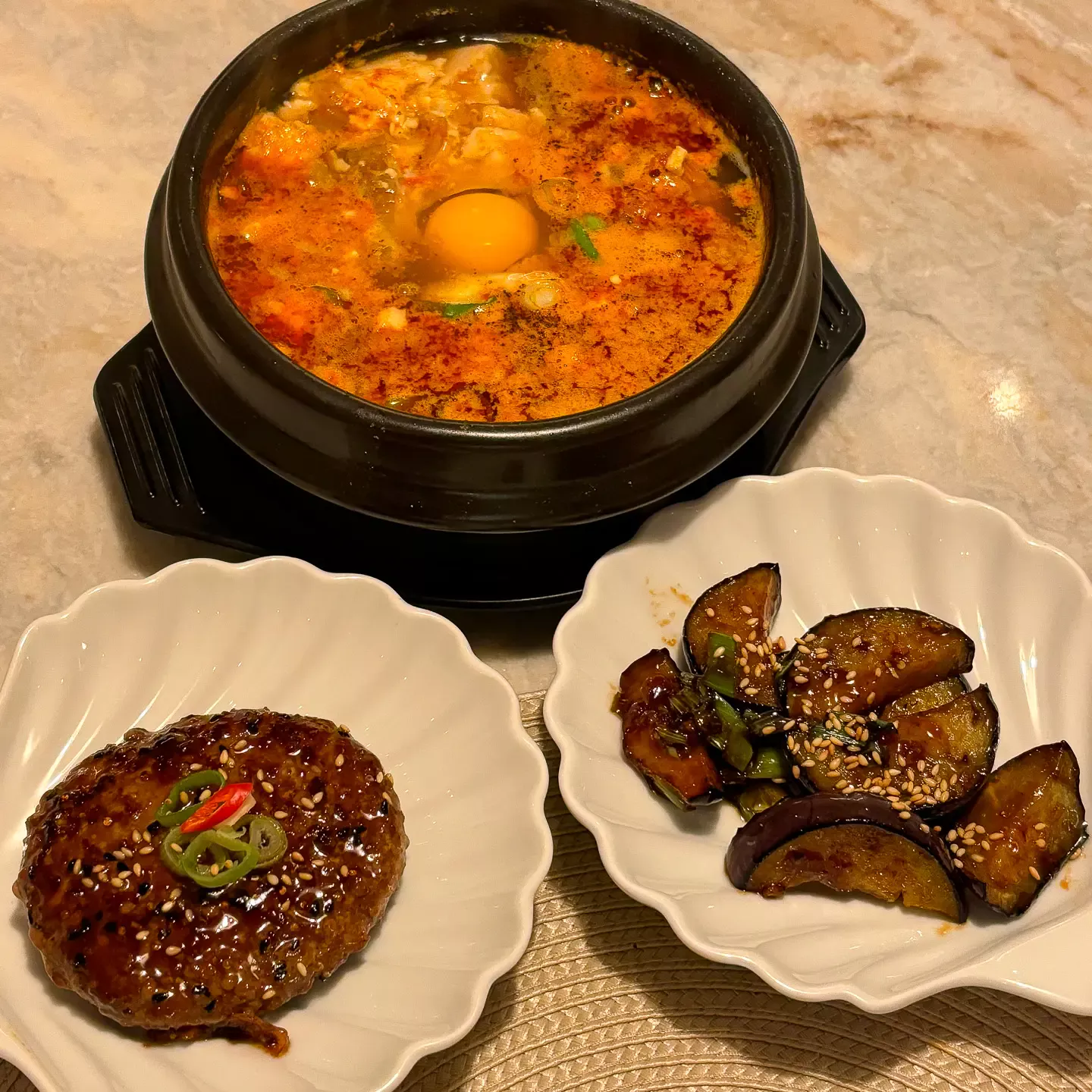
Other Popular Korean Jjigae (Stew)
Beef Sundubu Jjigae (Korean Spicy Soft Tofu Stew with Beef)
Unlike today’s Seafood Sundubu Jjigae, this version uses beef as the base for the broth. As the beef fat melts into the soup, it adds a deep, savory richness that makes this one of the most comforting Korean tofu stews.
Beef Sundubu Jjigae (Korean Spicy Soft Tofu Stew)
Pork Kimchi Jjigae (Korean Pork and Kimchi Stew)
When Koreans make Kimchi Jjigae, pork is the most common main ingredient — especially pork belly, shoulder, or neck cuts. This stew is made with aged kimchi (shin-kimchi), giving it a bold, tangy flavor that deepens as it cooks. If your kimchi tastes too sour, don’t worry — try my cooking tips from this recipe section to balance the flavor and make your kimchi jjigae even more delicious.
Easy Pork Kimchi Jjigae with Aged Kimchi
Budae Jjigae (Korean Army Stew)
Loved by both Koreans and foreigners, Budae Jjigae is one of the most iconic Korean comfort stews.
The broth is flavored with spam, sausage, gochujang (Korean chili paste), and kimchi, creating a uniquely savory and spicy taste. Many people add ramen noodles to it, but in Korea, ramen is just a side — the real way to enjoy Budae Jjigae is with steamed rice.
Authentic Budae Jjigae, Korean Army Stew
FAQs About Seafood Sundubu Jjigae
What is the difference between Sundubu Jjigae and Kimchi Jjigae?
Sundubu Jjigae is made with extra soft tofu (silken tofu) as its main ingredient, while Kimchi Jjigae uses kimchi as the star. Both are classic Korean stews, but Sundubu Jjigae has a creamier, milder texture, whereas Kimchi Jjigae is tangier and spicier.
What is Sundubu Jjigae made of?
Sundubu Jjigae is made with silken tofu (sundubu), a flavorful broth base, and your choice of protein — beef, pork, or seafood like clams, shrimp, or mussels.
It’s seasoned with Korean chili flakes (gochugaru) for spice, soy sauce for depth, and fish sauce or tuna extract for umami. For an easy version, check out my full Seafood Sundubu Jjigae recipe above.
Is Sundubu Jjigae healthy?
Yes! This stew is high in protein from tofu and seafood (or meat) and is generally low in calories. And this seafood sundubu jjigae is lighter and healthier than beef sundubu jjigae. It’s also a great way to warm up your body — especially on cold days.
Can I put kimchi in Soondubu Jjigae?
Many non-Koreans like to add kimchi to Soondubu Jjigae, and that’s totally fine if you enjoy the flavor! However, most Koreans traditionally don’t add kimchi to sundubu jjigae — it’s usually made with a clean, spicy seafood or meat broth instead.
Is Silken Tofu the Same as Soft Tofu?
Not exactly. Silken tofu is much softer and more delicate than soft tofu. It breaks apart easily and gives Sundubu Jjigae its signature silky, smooth texture.
Is Tofu Soup Good for Weight Loss?
Yes — a serving of Seafood Sundubu Jjigae has around 300 calories, making it a light but filling meal. Just be mindful of the sodium content, as the broth can be salty. It’s best to enjoy the tofu and seafood and leave a bit of the soup behind.
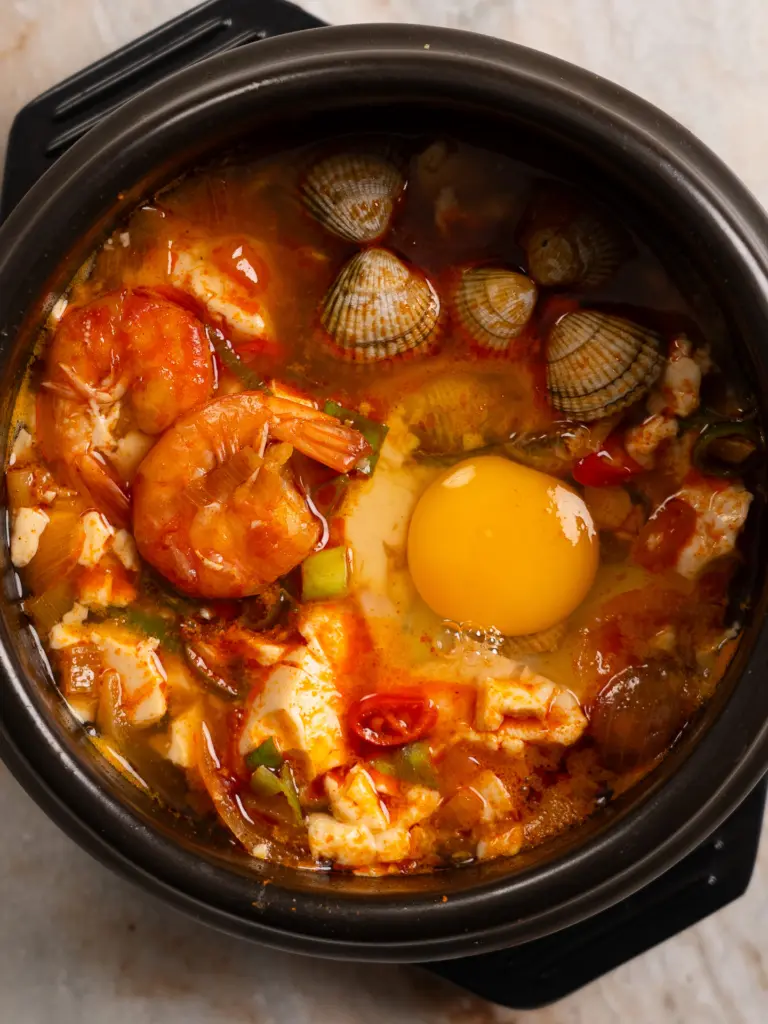
Get Ingredients for Seafood Sundubu Jjigae on Amazon
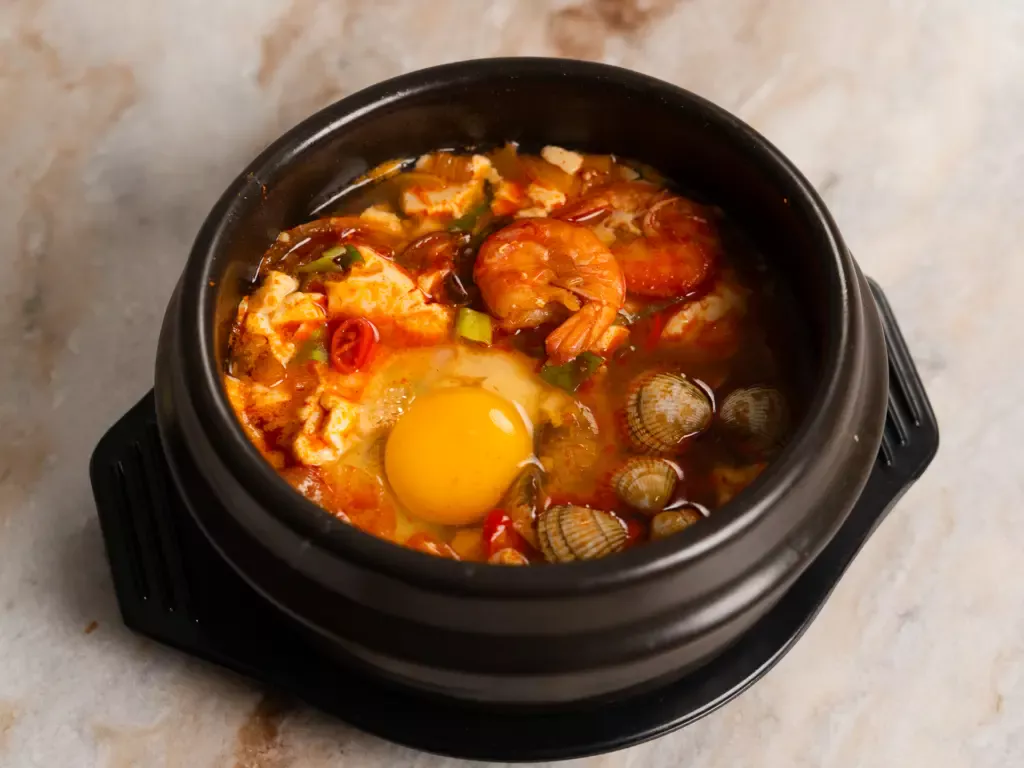
Disclosure: Blonde Kimchi is part of the Amazon Services LLC Associates Program, an affiliate advertising program that allows websites to earn advertising fees by linking to Amazon.com and promoting products.
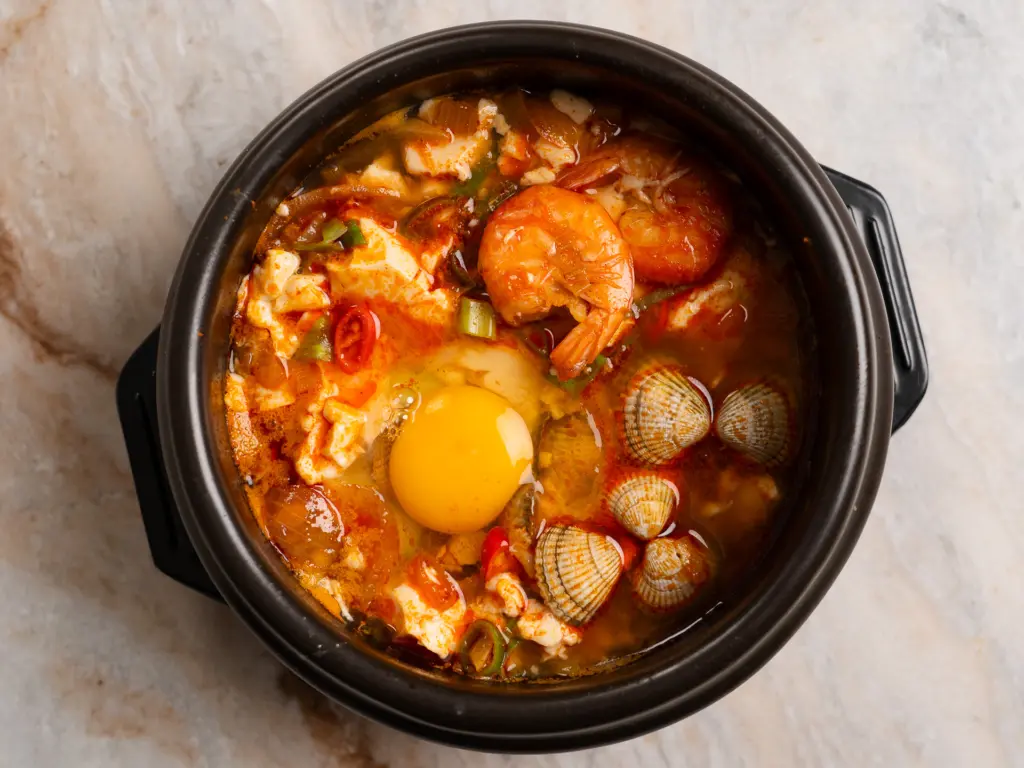
Easy Korean Seafood Sundubu Jjigae with Clams & Shrimp
Equipment
Ingredients
- 1 pack extra soft tofu (sundubu, silken tofu)
- 1/2 stalk green onion
- 1/2 onion
- 8 clams
- 3 shrimps
- 350 ml water
- 3 tbsp cooking oil
- 1 tbsp gochugaru (Korean chili powder)
- 1 tbsp minced garlic
- 1 tbsp soy sauce
- 1 tbsp tuna extract
- 1 tsp anchovy dashida
- 1 tsp beef dashida
- 1 pinch MSG (optional)
- 1 egg
Instructions
- Slice the onion thinly and chop the green onion.
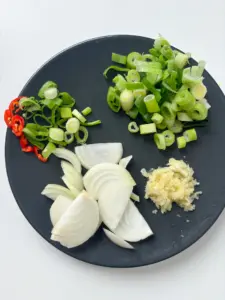
- Heat 2 tbsp of cooking oil in a pot over low heat. Sauté the green onion and minced garlic until fragrant.
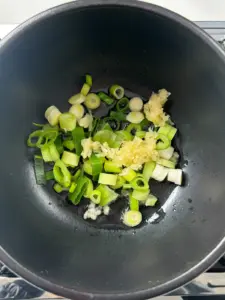
- Once the green onion oil is released, add 1 tbsp chili powder and 1 more tbsp cooking oil. Continue cooking over low heat to make chili oil. Be careful not to burn it.
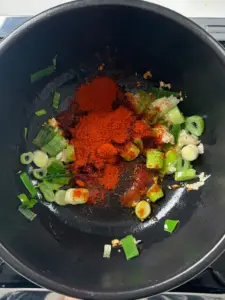
- Add the sliced onion and soy sauce. Stir-fry until the onion becomes slightly translucent.
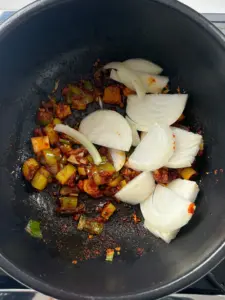
- Then add shrimp and clams and stir-fry briefly.
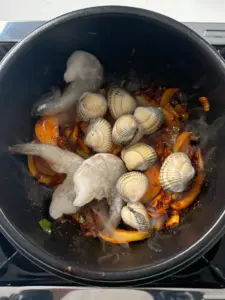
- Pour in enough water to cover the ingredients and bring to a boil over high heat.
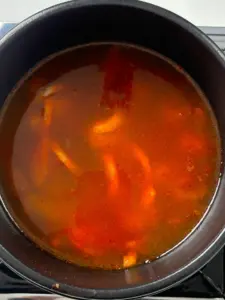
- Add tuna extract fish sauce, anchovy dashida, beef dashida, and MSG. Let it boil.
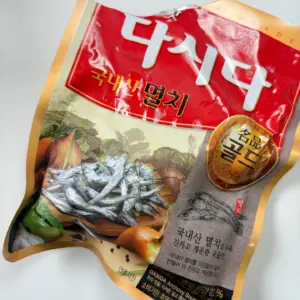
- Add the soft tofu and roughly break it with a spoon.Note: Tofu releases water, so the stew may taste mild. Adjust with a little salt if needed.
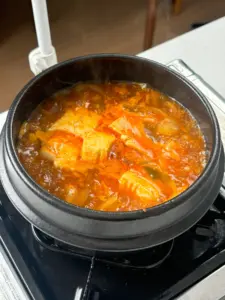
- Turn off the heat and crack a raw egg on top.
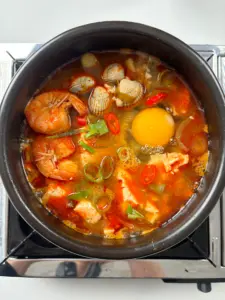
- Before serving, mix gently while the broth is hot to let the egg cook naturally.
